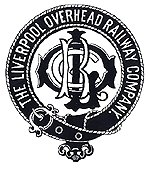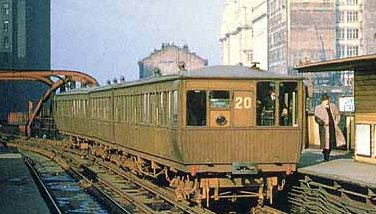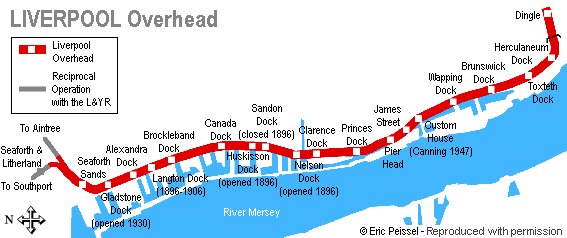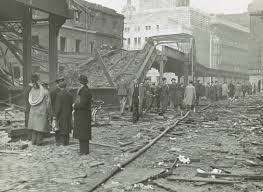Index
- LOR Home
- Seaforth Sands
- Gladstone Dock
- Alexandra Dock
- Langton Dock
- Brocklebank Dock
- Canada Dock
- Huskisson Dock
- Sandon Dock
- Nelson Dock
- Clarence Dock
- Princes Dock
- Pier Head
- James Street
- Canning
- Wapping Dock
- Brunswick Dock
- Toxteth Dock
- Herculaneum Dock 1st
- Herculaneum Dock 2nd
- Dingle

Liverpool Overhead Railway
(1893 - 1956)

The Liverpool Overhead Railway (LOR) was an overhead or elevated line, the track level of which was 16ft above the streets. The line was carried on an iron structure of columns which supported a deck
to which the track was attached. It was an electric line from the start
An intensive train service provided by three-coach electric multiple units was operated throughout the day, sometimes at only a few minutes' intervals
On December 21 1896 an extension to Dingle was opened which became the southern terminus
The LOR soon recognised that the commanding views from their trains of the dock estate and the ships within it were an attraction so they provided day tickets allowing passengers to board and alight from trains at any of the stations along the line, with unlimited travel. Locally the line became known as the 'Ovee' or the 'Dockers' Umbrella'. The latter name referred to the fact that dockers would walk under its structure in inclement weather to shelter from the rain
Work had begun on the Gladstone Dock complex in the early years of the 20th century and a graving dock that was part of the complex had opened by 1913. By 1930 the area around Seaforth Sands station had become an industrial docklands and the sand dunes were no more but the station was busier than ever
Between December 1940 and January 1942 Liverpool was bombed by the German Luftwaffe and the LOR received a number of direct hits but, being vital to the smooth running of the docks, it was patched up and services were restored as quickly as possible
In 1955 an engineering inspection of the LOR structure showed that extensive damage had occurred over the years and in places it was seriously corroded. Despite having a healthy revenue the LOR did not have the finance to undertake the repairs. There was much discussion, including talks with the city council about a municipal takeover, but nothing could be agreed
As no rescue package could be agreed, the LOR decided upon complete closure and, despite a great deal of local protest, the last train departed from Seaforth Sands at 10.06pm on December 30 1956. The last arrival was at 10.36pm on the same day. After the train had arrived at Seaforth Sands a message was relayed to Dingle and the electricity supply to the line was switched off. Over the coming weeks trains were transferred from the southern end of the line to Seaforth Sands. On September 23 1957 demolition began, and the overhead structure was taken down; the process was complete by January 1958

An intensive train service provided by three-coach electric multiple units was operated throughout the day, sometimes at only a few minutes' intervals
On December 21 1896 an extension to Dingle was opened which became the southern terminus
The LOR soon recognised that the commanding views from their trains of the dock estate and the ships within it were an attraction so they provided day tickets allowing passengers to board and alight from trains at any of the stations along the line, with unlimited travel. Locally the line became known as the 'Ovee' or the 'Dockers' Umbrella'. The latter name referred to the fact that dockers would walk under its structure in inclement weather to shelter from the rain
Work had begun on the Gladstone Dock complex in the early years of the 20th century and a graving dock that was part of the complex had opened by 1913. By 1930 the area around Seaforth Sands station had become an industrial docklands and the sand dunes were no more but the station was busier than ever
Between December 1940 and January 1942 Liverpool was bombed by the German Luftwaffe and the LOR received a number of direct hits but, being vital to the smooth running of the docks, it was patched up and services were restored as quickly as possible
In 1955 an engineering inspection of the LOR structure showed that extensive damage had occurred over the years and in places it was seriously corroded. Despite having a healthy revenue the LOR did not have the finance to undertake the repairs. There was much discussion, including talks with the city council about a municipal takeover, but nothing could be agreed
As no rescue package could be agreed, the LOR decided upon complete closure and, despite a great deal of local protest, the last train departed from Seaforth Sands at 10.06pm on December 30 1956. The last arrival was at 10.36pm on the same day. After the train had arrived at Seaforth Sands a message was relayed to Dingle and the electricity supply to the line was switched off. Over the coming weeks trains were transferred from the southern end of the line to Seaforth Sands. On September 23 1957 demolition began, and the overhead structure was taken down; the process was complete by January 1958


| Station name | Opened | Closed to passengers |
|
| Seaforth Sands | June 1849 | Dec 1956 | |
| Gladstone Dock | June 1930 | Dec 1956 | |
| Alexandra Dock | Mar 1893 | Dec 1956 | |
| Langton Dock | May 1896 | Mar 1906 | |
| Brocklebank Dock | Mar 1893 | Dec 1956 | |
| Canada Dock | Mar 1893 | Dec 1956 | |
| Huskisson Dock | May 1896 | Dec 1956 | |
| Sandon Dock | Mar 1893 | May 1896 | |
| Nelson Dock | May 1896 | Dec 1956 | |
| Clarence Dock | Mar 1893 | Dec 1956 | |
| Princes Dock | Feb 1893 | Mar 1941 | |
| Pier Head | Feb 1893 | Dec 1956 | |
| James Street | Feb 1893 | Dec 1956 | |
| Canning | Feb 1893 | Dec 1956 | |
| Wapping Dock | Feb 1893 | Dec 1956 | |
| Brunswick Dock | Mar 1893 | Dec 1956 | |
| Toxteth Dock | Feb 1893 | Dec 1956 | |
| Herculaneum Dock 1st | Feb 1893 | Dec 1896 | |
| Herculaneum Dock 2nd | Dec 1896 | Dec 1956 | |
| Dingle | Dec 1896 | Dec 1956 |